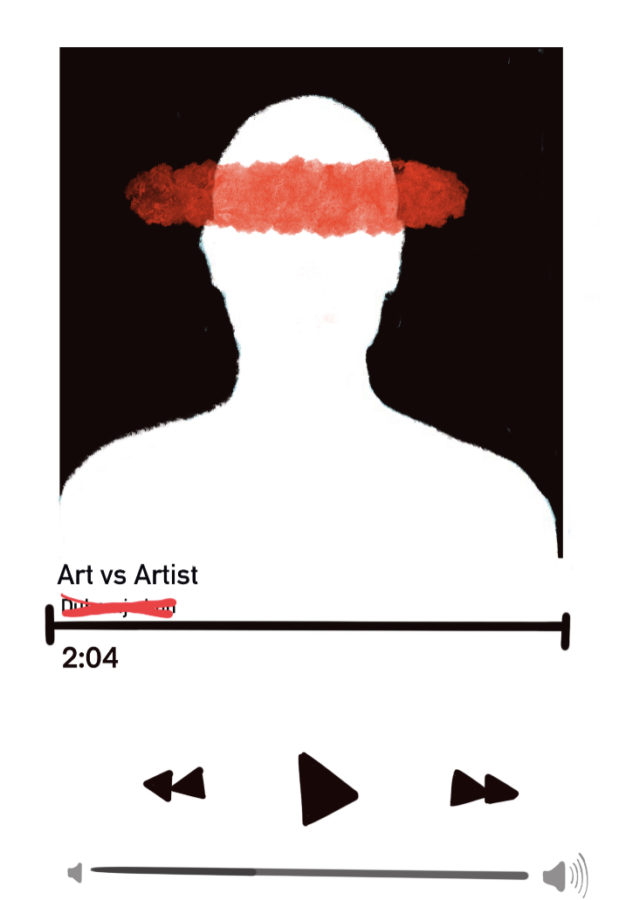Challenging Perspectives: Can you support the art without supporting the artist?
March 29, 2023
Yes.
In this new age of social media influence, cancel culture, and Covid-19, society is filled with contradictions about the ethical standings of our decisions as a whole. Recently, popular conversation surrounds cancel culture and how we should deal with problematic artists and their work. While many stay neutral, there are still others who suggest we should completely boycott a canceled artist’s work. I’m here to say that we should take a different approach, and stop thinking so much.
If I walked into an art class one day and told the teacher that they should never use Picasso’s work or teach about it because of how horrible of a man he was, from how he emotionally abused women, do you think they would listen?, do you think they would comply? Absolutely not. Some teachers may think it over, but at the end of the day, who cares how ‘unethical’ it is to enjoy and appreciate literal beauty and history. Picasso may have not been a good person, but why is mine or your job to chastise him for it by not observing his masterpieces?
Many other extraordinaires and geniuses, like John Lennon, Dr. Suess, Mark Zuckerberg, etc., are known for both their extraordinary work and problematic personalities that caused a multitude of controversies. However, despite their pasts, nobody can deny the importance of their work and its societal impact. Even people who despise them still listen to their songs, read classic childhood stories to their children and go on Facebook or Instagram.
The truth is, we as people will never be able to be ethically correct in a society that was built on top of unethical bones. We’re selfish at heart, and unless personally offended, we usually would not stop supporting or enjoying content created by a problematic artist. It’s not an excuse, it’s our reality.
Which brings up the topic of ethicality. Can supporting the art create an ethical problem? Am I a bad person if I decide to keep a song on my playlist? Am I an anti-semitic, trump-loving, racist and taylor-swift hating person just because I decide to enjoy a Kanye song on my playlist? Absolutely not. If we were to stop enjoying a form of art because the artist is problematic, this exposes many concerns regarding the morality of others. Many pieces of classic literature, revolutionary philosophies, iconic music and timeless movies would all be completely disregarded if we were to go through and judge them based on their creators alone.
While art should be judged solely on its quality, a person should not be praised merely for their work. Many artists and creators can be extremely creative and revolutionary, but that should not automatically mean that they are genuinely good people. For example, we use revolutionary ideas from many philosophers and scientists every day. Charles Darwin’s theory on natural selection is a foundational topic in the science classroom. But what we do not hear as often is his racist pasts and how his ideas were used to exclude people of color from our future. However, regardless of his racial prejudices, his ideas were revolutionary. His studies helped countless people and were used for the better of society. It does not disregard his racist actions, and he should have still been held accountable, but it does not mean the world could not try and benefit from his teachings. If we were to all of a sudden stop using content from all problematic creators, the world as we know it wouldn’t exist.
On top of that, there are still so many ways people can enjoy art without supporting, promoting or funding the artist. People do it all the time by buying things second hand, or enjoying media from indirect sources that do not financially support the creators. On top of that, promoting artists is just as easy as not promoting them; simply don’t post their content or influence people to go and buy said artists’ products. Don’t want to fund your favorite romance writer because she’s problematic, go to half priced books. If it matters enough, you can take steps to change while still holding onto your joy.
When supporting the art, you can choose not to support the artist. It should not be considered an excuse or seen as unethical. As people, we make choices every day based on our moral compass. But we also need to stay realistic. If it’s your favorite song, you should not have to stop listening to it. If you came up to my face and told me one problematic behavior each of my favorite singers has, I would laugh at your face and keep listening to them. It’s not that deep, I just refuse to change my lifestyle just to feel like I’m a good person. If you enjoy the meaning of the lyrics, who is stopping you from letting them inspire you? Content is simply put out into the world for others to take and make something out of. Having a creator’s background attached to it would make most motivation and creations in the world disappear completely. Ultimately, you can use a problematic person’s work and turn it into something beautiful that the world can thank you for.

Nishita stayed with the Tribune not just because she loves to write, but because the Tribune is like a family too her and she aims to help grow and work with newer writers in the years to come. This will be...
No.
On Feb. 10 of this year, Avalanche Software released Hogwarts Legacy, a video game adaptation of J.K. Rowling’s “Harry Potter.” Battles have been occurring inside and outside this game, as people argue about the ethicality of playing a game that benefits a problematic creator.
In light of this recent event, I was left contemplating whether one can truly separate the art from the artist in order to enjoy their work but not support their beliefs. At some point I was reading an article about the artists of the past whom we idealize today and the author made a statement that stuck with me: “just because we can separate the art from the artist doesn’t mean we always should.”
With the amount of progress we have seen in the movements vying for equality and fair treatment, it seems counterproductive to support those who are problematically straying away from this ideal. For example, the #MeToo movement that has resurfaced in the past couple years outed prominent male figures for their past transgressions against women. Society has reached a point where women have a platform to speak up and stop the oppression. We see the same thing in various minority groups, from the Black Lives Matter movement to the fight for LGBTQ+ rights. Knowing the power in numbers and also the amount of progress we have made, it would be doing ourselves a disservice to not fight for a change of the status quo. The need to change the narrative in order to acknowledge the history, and therefore the artist’s own problematic background, falls upon the critics and the consumers. It is up to the everyday people to call out these artists. And we see this issue through every medium of art, going further than the aforementioned video game.
Look to the painting world for an example. Picasso’s granddaughter, Marina Picasso, described how Picasso treated women in her memoir saying that “He submitted them to his animal sexuality, tamed them, bewitched them, ingested them, and crushed them onto his canvas. After he had spent many nights extracting their essence, once they were bled dry, he would dispose of them.” This is seen in the apparent themes of toxic masculinity throughout his artwork.
For example, The Weeping Woman by Picasso included contorted features of Dora Maar with acidic colors that represented her anguish.
It is easy to chalk up these issues to the time period and overlook them because of the historic importance of an artist. However, an artist’s flaws cannot be so easily denied. While earlier art holds a special place in museums, universities and may be mass replicated for everyone to have a copy in their house, it is time to acknowledge the faults in an artist’s viewpoints. Only then can we take the time to re-contextualize these pieces of work. People should look at Picasso’s work and think about the way he dehumanized women through his artwork and the problems that stem from this issue.
We as consumers cannot let artists continue to replicate the mistakes of the past. And we as human beings with empathy cannot simply ignore the inherent and underlying presence of bigotry within art.
The impact of staying silent goes further than just the art. For example, popular American rapper Kanye “Ye” West recently made anti-semitic comments on social media. Though several large companies and brands steered away from collaborations with him, his words made an impact on select fans. In October 2022, a group hung banners over a Los Angeles freeway with anti-semitic messages including “Kanye is right about the Jews.” This was just one of many ways fans responded to West’s sentiments. Those who follow him started out as fans of his art which grew into a community of supporters for the artist.
At the end of the day, it is up to you as the consumer to choose how you interact with the art. It is your obligation, in fact, to communicate to artists that moral ethicality trumps any work of art. The question isn’t whether you can support the art without supporting the artist. The question is how can you not be?

Rhea stayed in the Wildcat Tribune because she loves the community it creates and enjoys writing about stories that matter to the people not just in her community but around the world. This is Rhea's third...
